What is the Role of PLAY in Kindergarten Today?
The reality is that education is always changing. Are children? Changing? Are five year olds of today significantly different than the five year olds of five years ago? Or their predecessors of a decade back? In my travels making author/illustrator school visits around the country I hear teachers venting about the expectations for their kindergarten classroom.Rigor is one thing. LUV me some high expectations! Institutionalized prohibiting of recess in kindergarten? That's another. Can you guess where I was when I heard of a school that forbids recess? Do you know how much recess time your school district allows? For kindergarten?
Hearing from teachers in my travels is one thing. Sending my WonderTwins (that's my grand-kiddos, for any new visitors here) to Kindergarten is quite another. Friday was their first mongo-bus ride into the big-time. They're little. Truly. Their birthday is late in April. That will make them the very youngest in the tribe. Their backpacks are as big as they are! All of these facts filled me with a multitude of emotions, seeing the photo of their official launch. So I went looking for a quote about kindergarten and you've seen the result of my search.
Posting the image above to my FB fanpage, Instagram and Twitter, I asked my fellow bloggers and followers to respond. Is their classroom anywhere near a garden? How about the rest of Froebel's thoughts? Where is play these days on the pendulum? There are many factors at work when it comes to classroom, curriculum design and the school day unfolding in fact and reality. Politics and legislation are now a conundrum that get mixed in with best practice, research and professional training and experience.
 |
| A 'Kinder-Garden' Word Wall |
I have gathered up the responses here to open a conversation. Pour yourself a cuppa cuppa and listen to the heartfelt sentiments expressed. Then ask yourself some questions. Even if you don't have a child crossing the threshold of a kindergarten classroom, this conversation is important to join, or at the very least to hear.
"I am a kindergarten teacher and I still incorporate play into my curriculum. Play promotes cooperation, respect, responsibility, sharing and kindness. Play in kindergarten offers a safe arena for learning how to deal with people as we grow. Should kindergarten be all play? Absolutely not! We must prepare our students for the world and their minds are so eager to soak up knowledge! BUT I have found that adding a few minutes of Free Play into the day creates children who become more independent in their choices which helps when they are making ACADEMIC choices in their literacy and math rotations. Play also creates a foundation for an independent adult. I have found that many kids have trouble with play because their days are so scheduled by adults that when faced with the choice of what to do, they are stumped! My daily free play lasts no more than 15 minutes and I do not plan to remove it from my curriculum! BTW..... although my classroom does not FACE a garden, we do have a 'Kinder-garden' on our school grounds that my students use and visit!" ~~ Cindy, Love Those Kinders!

"Sadly, Kindergarten is the new first grade. It's too academic and no longer allows our students to learn the basics such as sharing, kindness, friendship, creating and exploring. I fully believe that lack of real kindergarten is why the all important test scores are so poor. If our students had a year to learn how to do school and be good citizens you would see a huge improvement in education across the board. But.... I still bring in as much fun, art, creating and dancing as I can. And guess what? My 'data' is still through the roof. Kindergarten Rocks!" ~~ Greg, Kindergarten Smorgasboard
"I agree that kindergarten is much, much more like first grade. Sadly, many parents do not realize this and have not had the knowledge or opportunity to prepare their children. Many preschools, daycares and home settings do not have the resources including qualified teachers to prepare children for such a huge academic leap. Hence... the reason we practice the 3 P's at the beginning of the school year. Unfortunately, the 3 P's all too quickly become the 3 W's -- work, work, work." ~~ Charlotte's expanded thoughts
"Even tho we are more and more tied to standards, and really have to push those little ones harder than they may be ready to move, I still marvel at the wonder in their eyes. They still tend to make the very best of what we throw their way, and when asked, they rise to the more rigorous challenges presented to them. I am awestruck at the end of each year when I see how incredibly far we have come. It is such a privilege to be a part of their lives for a year. I disagree that we should be so academic-- they need time to explore, play, resolve their own conflicts, etc. I believe time to grow has been lost in today's kinder classes. That being said, I still try my level best to give them opportunities for just plain fun! There is a way to get those standards in and still have fun. I will know it's time to quit when I stop having fun. Who could not love kindergarten?" ~~ Maggie, of Maggie's Kindergarten
"I love the idea of a Kinder "garden." Like Greg said, gone are the days of worry free kinder, we are the new first grade. With that being said, I try to make my room as 'old school' as possible. I do allow free choice centers and we start off the year working with Fine Motor and Gross Motor activities." ~~ Kaci of Mrs. Hoffer's Spot
"We really are the new first grade teachers. My classroom has never had a housekeeping center or kitchen. It is my job to include the play aspect in my class through hands-on activities and exploration." ~~ Jennifer Gibbons of Teaching with Grace
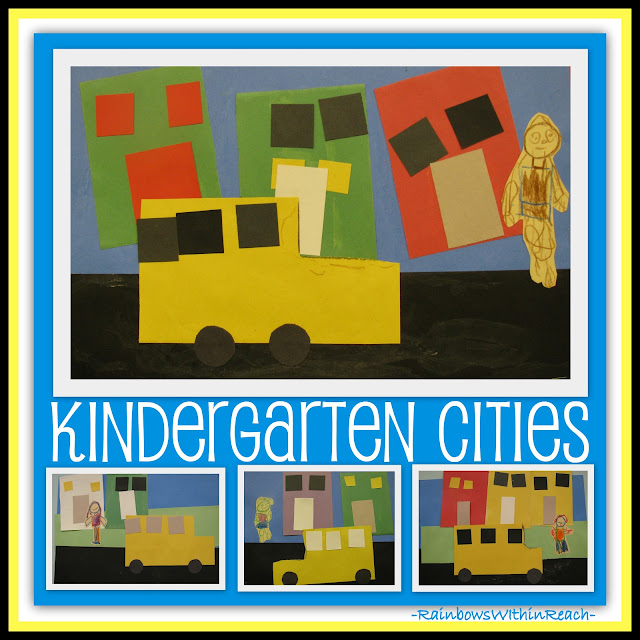
"My kids kindergarten class had a garden.... they went outside in the spring to plant and watch their flowers grow. It was a great experience for them, and for the group of moms, myself included, who went there during the summer to keep it up, along with our children's help. Great memories for me and my two kids, who are now in high school!" ~~ Kathleen
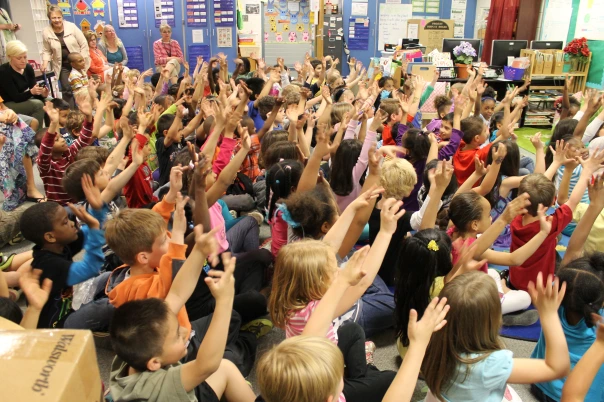 |
| Kinder Kiddos Participate Enthusiastically with Debbie Clement in Kristen's Kindergarten Classroom |
"I taught first grade for 21 years and kindergarten for the last 7 years.... I am teaching my Kinders what I taught in first grade. Many of my children do not attend pre-school and are just not ready for the rigors of the Kindergarten day. I truly believe children need to play and I incorporate free choice time into my daily schedule." ~~ Melody
"I have been teaching for many years. Yes the standards have changed but the kids are still 5. I still include play centers and try for 20 - 30 minutes. We also play outside every day. I wish we did not have to spend so much time testing!" ~~ Emily
"That is what kindergarten should mean." ~~ Marlene
"I didn't even go to Kindergarten. It wasn't required when I started school. I can't even imagine that today. We seem to think there's something wrong with kids if they haven't gone to preschool nowadays! I remembered hearing some of my friends talk about kindergarten when I was little. It was always a positive conversation and I always felt like I missed out on something fun! I really don't believe that today's kids would have that same conversation. Teachers try really hard to make school as fun as it can be, but truth is, we HAVE to have good test scores to keep our jobs. Sometimes that equals no fun at all. We are creating a society of people who care nothing about relationships with others or a love of learning..... Because no matter what we say, we all know deep down that its all about the test. We know that's not what we want, but how do you explain that to experts and leaders without sounding like you want to take the easy way out and play all day?" ~~ Crystal
"It's a balance that I refuse to let tip to one side or the other. There is a time to work and a time to play. We have a circle of sunflowers right outside our door and a vegetable garden behind the school." ~~ Jennifer
"Kindergarten is a place where children should play. The greatest learning is done through play developmentally. There is a teacher who gave each kindergartener at open house a little bag of 'Jitter Glitter.' That was supposed to take away the jitters when they come to class. They should be singing songs, doing fingerplays and learning nursery rhymes. Now we have people who are IN CHARGE of the aspect of teaching... the problem being they have never stepped foot into a classroom. When a 5 year old tugs on your shirt and says 'I miss my mommy'...... well, where is that in the common core.... I rock them. I hug them. I comfort them. We have to make them confident little people who are eager to learn everything. Some of them are learning that children are different. Playing is different. How can they sit and write and do WORK when their little muscles can't even hold a writing utensil? That is not what our Politicians see.... they don't experience that, so they should not make the decisions that are not right for our children. If we are to grow successful adults we have to nurture the little children." ~~ Barbara
"I have taught first grade my first 16 years and have now taught Kinder for 15. They have caught up! I hate that Kindergarten has become what first grade use to be. If one of my kids comes in not knowing their letters or not writing their name, they are labeled 'low'............ really??? Wasn't that our job?? It is ridiculous!" ~~ Ampy
"I am thrilled to teach Kindergarten this year. I have spent many years in a play based, developmentally appropriate preschool. I am so fortunate to be in a school lead by an administrator who focuses on the whole child. In my class we have a workshop model that uses centers. I think so much more is expected of our lovely kinders. It takes a special teacher to remember they are only 5 and need to play and learn through experience. It is challenging to run a play based program in an academic world, but it can be done!" ~~ Barbara

"My room last year looked out onto our school garden. My students love planting and cultivating. I even planted sunflowers with them at the end of the year so that when they return in September they can see them in bloom. Unfortunately I found out a week before school ended that I was moving my classroom to the other side of the building. No more view of the garden. I am sad, but I just might have to plant some sunflowers outside my new classroom window. I am just happy we have a school garden for our students to learn and grow from." ~~ Melina

"I agree with the post about more behavior problems. I have been in kindergarten for 18 years. No matter what we do the first grade teachers want more. We can not make parents help them at home. I give my students free centers while I call groups. I would spend weeks making cute center stuff and and still have them begging to play. No matter how much you push a child is not ready to really read till first grade." ~~ Deneen

 |
| Welcome Banner Created for SKYPE author visit with Debbie Clement by Terri and her Kinder Kapers in Nevada! |
"I taught kindergarten and preschool for a few years. I still believe we need to "let them be little" in K as we prepare them academically. Whole child, hands-on, learning through doing as much as possible. I think sometimes this can be lost in the testing-driven culture of the day. Happy to see so many awesome teachers keeping it alive! " ~~ Primary Practice via Instagram

"Kindergarten means pure JOY!" ~~ Julia

"Kindergarten children need to explore and play -- they are 5! I work my kindergarten kids hard, but we play too! If I ever have to take out my 'developmental' centers, I will need to leave kindergarten." ~~ Louanne of 'My Kindergarten Kids'

"Kindergarten is a place to make the intellect blossom. It's a place to begin the journey of loving learning, loving books, loving friends, loving teachers. No, it's not a boot camp, but when my students end the year, they know how to write a sentence, read a book, listen to their teacher, do Daily 5, BUILD, and have a step up on the road that lays before them. No, no garden, but trips to the closest park, and every day on the playground. It's not a garden of plants. It's a garden of kids and fun." ~~ Denise

"Play is a must! I'm so thankful my school still allows centers that aren't 'academic.' We have housekeeping, blocks, art -- considered 'choice' centers. Other choices are science and poetry. Reading, math, writing, abc are academic." ~~ Frannie via Twitter

"I totally agree Frannie! Play is a child's work -- how they learn. I have building, dramatic play, playdough and more." ~~ Barbara chiming in on Twitter

"This is what K and 1st mean to me! We "play" all day, everyday to develop those much needed thinking, talking, listening skills for the upper grades. Just because they move from one grade to the next doesn't mean that the learning and discovering shouldn't still be play." -- Cara of 'Kindergarten BoomBoom'
"Careful what you ask for Miss Debbie, you may get a small dissertation. But here is how I weigh in.... It is disheartening when you consider the demands put on kindergarten students today. Legislation has pushed academia so far that today, even though kindergarten is only required of age appropriate children in approximately 20 states or so, many states have kindergarten achievement standards that students and teachers are expected to achieve. One constant in this history change and evolution of kindergarten is the way in which kindergarten aged children learn. Developmentally, they function the same way that children their age did 100 years ago in Froebel's kindergartens. The ways they socially interact, play and solve problems remain the same. They need opportunities to be exposed to ordinary experiences, they need to touch and manipulate objects, hear language in many forms, sing, move, see and explore various environments. This lays the foundation within their brain for acquiring more complex skills such as reading, writing and computation. If a child's brain has these kinds of experiences during their kindergarten year, it will grow naturally." ~~ Marsha of 'Differentiated Kindergarten'
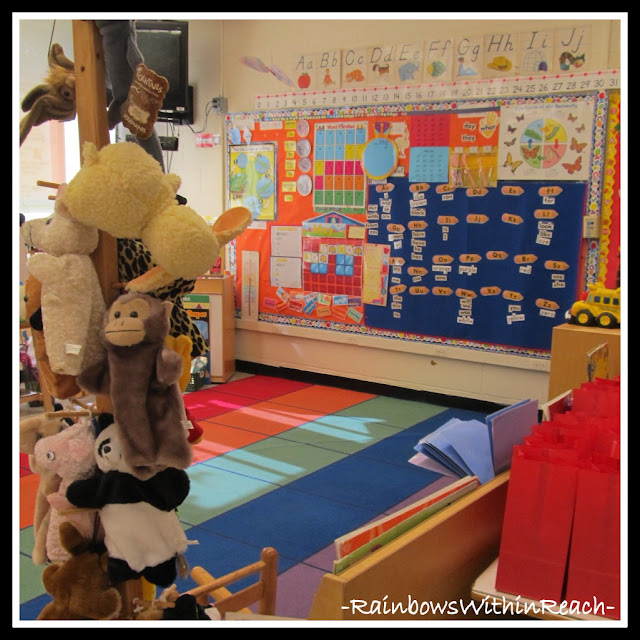
"I think Early Childhood Education as a whole is becoming too bogged down by the expectations of the higher grades. The third grade teacher complains that the 2nd grade teacher didn't do enough, the 2nd grade teacher blames it on 1st grade and the 1st grade teacher complains that there's too much play in kindergarten for students to learn what they need to know. What everyone forgets, in the stress of trying to secure their jobs against low test scores, is that playing IS learning for our kinders. When we make learning fun, we motivate our students to want to participate! Our students will learn more when they are able to express their interests and process things in their own way, at their own pace. I love to quote Fred Rogers: "Play gives children a chance to practice what they are learning." And really, if we work at it just a bit, we can make the case for more play in the classroom - I still have centers even in my 1st grade classroom this year, simply because I can justify each one to the administration -- children playing with the puppet theatre? RL.1.2! Students "playing" at block center? 1.G.2! It takes a bit of extra work to keep anecdotal records of the learning at each center, and to make sure that the centers are set up to encourage specific exploration, but my students are much happier learning this way than through rote drills or worksheets!" ~~ Herding Cats in Kindergarten
"The expectations for kindergarten students and teachers seem to rise every year. As more demands are placed upon teachers, it becomes apparent that something has to give. Unfortunately, time for play is often sacrificed as teachers bow to academic pressures from parents and administrators. It is so important to remember that kindergarteners are just 5 or 6 years old and play is a vital part of their development. Children gain physical, cognitive, language, and social skills through play with their peers. It is a valuable use of time to provide at least a few moments of play in the academic workday." ~~ Maria of 'Kinder Craze'
 |
| Kinder Craze SKYPE visit with Debbie last spring! |
"I am reading the thoughtful comments that have been left on your blog about the role of play and as I am going from teacher to teacher I feel myself getting a lump in my throat. I realize that in 2013 we are all about academics and Common Core. When I reflect on my own children I had the luxury of putting them in developmental kindergartens where they had a playhouse, a kitchen, and a dress up corner to learn how to share, treat each other with kindness and negotiate their understandings of the world with their friends. They learned how to pretend, dream, build literacy, collaborate and just have fun! I view them as successful adults who dare to take a risk and can think on their own feet. What happened? High stakes testing has impacted on our youngest children and many of them spend hours doing academic work without enjoying sunshine or knowing the joy of planting a garden. I often feel guilty that I am a part of this and have been known to go outside and play with my class, teaching them a game or how to jump rope. I have given in to this whole philosophy when my gut knows better. Moderation is probably the key and I can only hope that the pendulum swings back sooner rather than later. As the saying goes.... 'Kindergarten children need to blow bubbles, not fill them in.' That just says it all." ~~ Fran Kramer of Kindergarten Crayons
 |
| Collaborative Kindergarten Quilt in Response to my Picture Book "You're Wonderful" |
That's a LOT of heartfelt insight, experience and observation. I'm not one to wish to turn back the hands of time. There is wisdom, however, in listening to the voice of experience as we go running pell mell into the future.
Fran's reference to the bubbles really resonated with me.
I hadn't heard that thought previously.
The power of the web.
I searched and found this image in reference.
If anyone knows who to reference for the quote,
I will happily alter my little bumper-sticker above
and give proper credit.

Thanks to all who added their voice to the conversation.
I certainly invite any other readers to add their two cents via the comment section below.

***Editorial Addition: This just in!
As is the way of the internet, we are each just a few clicks away from really great projects. From the initial comments left by readers, I have been given permission from Carolyn Kisloski to share her most impressive 'Prezi' presentation on the power of play.
Carolyn is a wizard at the Prezi. She is offering this presentation for free from her Teachers Pay Teachers store. With this amazing dedication to protecting play in the kindergarten classroom, I know you'll want to be a regular reader at her blog, "Kindergarten: Holding Hands and Sticking Together."
PLAY EVERY DAY
So many brilliant minds on the power of play!
Does your classroom face a garden?
What is the role of play in kindergarten today?
I hope that you are still singing together! I believe in the power of affirmation.
Therefore: I write songs of affirmation:
'Glad I'm at School Today.'
It's available for digital purchases here and here.
---------------------------------------
***Here are some of my previous articles that you'll want to investigate.
My first FB followers conversation on Classroom Decor:
How important is 'cute'?
{click pictures below to go to earlier article}


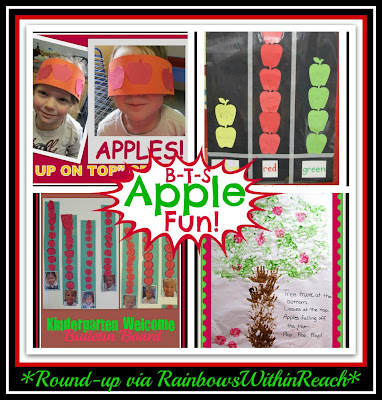


My first FB followers conversation on Classroom Decor:
How important is 'cute'?
{click pictures below to go to earlier article}





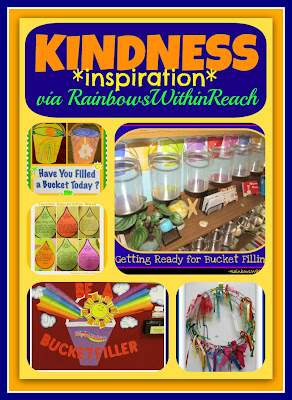

I hope that this article has given you food for thought, affirmed your convictions and reassured you that you are surrounded by passionate professional peers.
Please pin joyously from this article to invite others into the conversation.
| I'm now at 131,623 followers! |
 |
| Click this link to go there directly! |


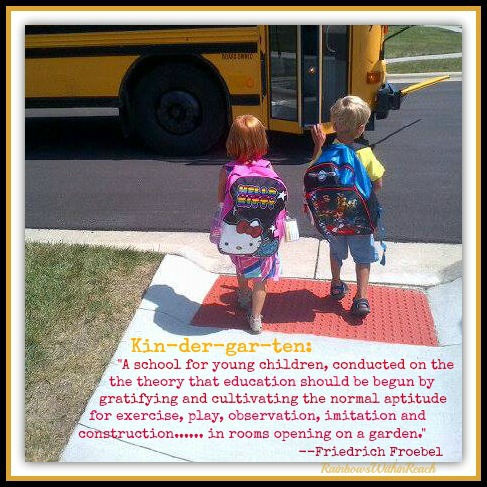













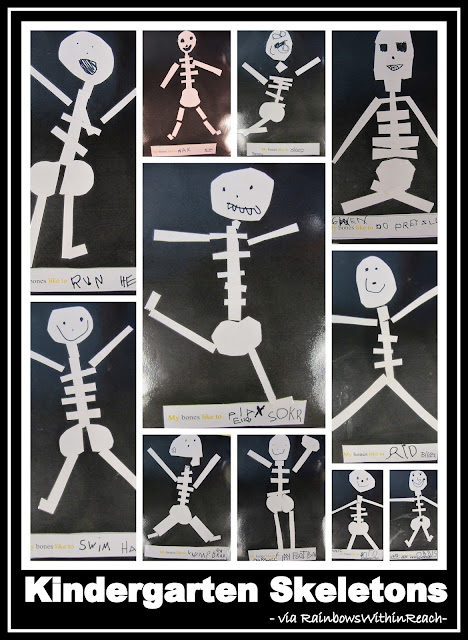









I love this blog post. It has such a beautiful message in it that all of us teachers should remember. We teach the whole child and when we do it in fun ways - such as through play we are tapping into the hearts of our little ones. We must teach them to love school and then we can build on that foundation with our academics. A lot of our play time starts off academic by exploring math manipulatives. Children in my room naturally start sorting and grouping objects, counting unifix cubes and making long trains. Thank you for taking the time to reflect on one of the most important parts of kindergarten. I hope teachers can all figure out how to make learning so fun that it's almost like play time. I've seen the work from many of the bloggers you've quoted and their lessons are very rigorous AND fun! Always, Laura from "Teacher Laura"
ReplyDeletehttp://laura-armstrong-martinez.blogspot.com/
Laura, I am not the least surprised that we are thinking on the same line of thought here. I'm especially appreciative of your referencing the term "WHOLE CHILD" in your response. Your insight that the teachers who responded have both rigor and fun is well spoken. It can be done. Blogs allow us to look over the shoulders of our peers and we can see 'examples' of best practice from around the world.
DeleteThanks for entering into the conversation with your heart-felt insight and experience.
Debbie
Hi Debbie! I made a Prezi about the Importance of Play. Here it is! http://prezi.com/k-ny0dsoyg89/?utm_campaign=share&utm_medium=copy I put together all of my favorite quotes from educators to remind me that I am right in protecting play for my kids! I loved this post!
ReplyDeleteKindergarten: Holding Hands and Sticking Together
Carolyn, Your Prezi presentation is a delight and simply brilliant. I have added the link into the article itself -- in the hopes of more people 'discovering' it!
DeleteThanks so much for sharing.
Debbie
Such an important topic- Thank you so much for sharing this conversation! I feel very fortunate that my daughter's Kinder class has play and learning together. They even still have a dress-up center! I think play is such an important part of a young child's development, just as other opportunities like music and art are. And I agree with others that hands-on is crucial for early learning, but unfortunately in many schools this is disappearing. I taught in a district where even in Kindergarten, it was all rote and worksheet instruction, where little 5 year-olds were expected to sit at a desk all day quietly. It broke my heart. "No time" for concrete, hands-on learning. They were losing such valuable learning opportunities, as well as possibly developing a negative feeling about school and learning in general. We have since moved to a district that supports the many things we believe are important in education. My daughter now has the opportunity to work in the school garden for science 'instruction' and even helps sell produce at the school farmer's market. :)
ReplyDeleteThanks for taking the time to share both your insight and your experience, Chelsey. It is amazing how things can be so different from district to district. I'm so grateful for your dedication to this important topic -- through your blog!
DeleteDebbie
Wonderful discussion Debbie! My daughter was in Kindergarten last year and I'm very grateful for her wonderful experience. Yes, they did have table time especially when learning their numbers & letters. But, I know her teacher did incorporate play as much as possible. She was in a half-day program and still had time to play at the sand table or in the kitchen center. They took walks and went outside as much as possible. They dissected a pumpkin... etc. And for anyone doubting the rigors of her classroom, I can tell you that she learned A LOT.
ReplyDeleteI'd also like to add that as a parent (and from the perspective of many parents that I know), parents don't typically understand the importance of play. They think that their young child needs rigorous academics in order to keep up with the demands of the world. I think us parents need a bit of education about why play is important and why kids do better learning through play. While I was counting my blessing for the existence of a sand table in my daughter's classroom, I'm sure there were other parents that thought their kids should be back at the tables instead.
Terri you bring up so many great points! How do we as educators help parents understand the VALUE of PLAY for our children? Yes. We must do all that we can to help bridge that gap. Certainly focus on 'academic' work is important for all children, but that can be addressed through a playful approach.
DeleteThanks for taking the time to add to the conversation.
Debbie
Here's a comment that was left on my personal FB wall. These are the thoughts of Alta Profitt, veteran of DECADES of experience in the early childhood realm.
ReplyDelete"Children can learn almost everything they need to know by playing with blocks, through art and music. Every skill can be taught through these three outlets. You build, you write about it. What you think can be said. What you say can be written. What you write can be read. I am afraid we will lose a generation of lifelong learners because of all the testing. Why do more learning after 13 years plus of testing? What adult has his/her own career based on one day at work, but children on one test can be labeled forever."
Amazing article! Nice to know so many teachers out there are doing the right thing! I just wrote a book about all the changes in education & how to put the magic back in teaching! Find out more at www.iwillnotresign.tateauthor.com
ReplyDeleteLori, thanks so much for reaching out. I hope that many will be directed to your work. I'm ALL FOR MAGIC! Bring on the magic.
DeleteDebbie
I can't tell you how much this blog post tugged at my little kindergarten heart. My kinder team often jokes that we actually teach first grade, but when you think about it, it's sad. Testing has overtaken our school lives, and no one realizes that you have to spend time teaching these kiddos how to go to school before you can even get into the nitty gritty of the curriculum. But at the same time, when you have benchmark tests and scores looming ahead, you can't give them the extra time they deserve without getting a ton of scrutiny laid upon you. My team puts in as much fun, craftivities, and movement as we can WHILE still teaching the common core... our kinder babies need it!
ReplyDelete--Caitlin
thekindergarden.blogspot.com
Your blog's title is the perfect one to continue this conversation, isn't it! I'm so grateful to hear how your team 'works' to incorporate the fun in the learning process. Here's to less scrutiny, Caitlin so that you can reach every benchmark in the most child-friendly and appropriate manner! We shouldn't have to apologize for PLAY in the day. Play can be all about progress towards goals.
DeleteDebbie
This is a wonderful discussion. I love the views of the teachers who feel "trapped" in this standards based craze and yet are still using their experience and knowledge of early learning to create environments that nurture the whole child. BRAVO Kindergarten teachers!
ReplyDeleteMy son is about the same age as the wonder twins. He has a May birthday and just started Kindergarten. I am all about rigor. I am all about great teachers. I am all about teachers having "accountability" (just not being accountable to test scores). I'm not saying this to brag but my new kindergartner is already reading and it's not because I bombarded him with paper/ pencil tasks or drilled him with flash cards. We just read a ton of books. We created restaurants and wrote menus. We read packages in the grocery store, etc.
He enjoyed preschool but now that he is in Kindergarten he is crying every single night about having to go to school. I know a large part of that is that he is exhausted. But I think a portion of the problem is that he sits in a desk and colors and does worksheets at school. He says school is "boring". He brings home math papers with CCSS coded in the top. On his NINTH day of kindergarten, he brought home a paper that said, "test prep" with bubbles to be filled in. Some have told me to request a new teacher, but I'm really not feeling like it is the teacher's choice. The test prep is a math "curriculum" that was purchased by the district. I hear so many teachers voicing that this is not their choice but is being pushed on them from someone higher up the ladder. The thing that concerns me is that the decision makers aren't listening to the voices of those who have education and experience in educating early learners.
My son is in a very tiny classroom. There are no puppet theaters, kitchens, etc. I haven't even seen any centers! He says they can sometimes do blocks or puzzles but only if they finish all of their worksheets. I feel a little trapped as a parent. I think that some parents may think this is "best". I've heard parents bragging that their child was doing algebra or geometry in K. They don't realize that building 3 dimensional shapes in a block corner IS geometry.
What steps would you take if your child was in a situation like this? I don't want to "complain" because it will look like I'm complaining about the teacher and it may not even be her choice??
Jackie, Jackie, Jackie.
DeleteWhat a heart-rending situation -- unfolding right in your home, in real time at this very minute. A child who is already 'successful' (i.e. reading) brought to tears over the thought of 'going-to-school' is the heartbreak of all time.
I know that you have keen insight from your vantage point: straddling the divide as reading specialist and mom-to-K-kiddo. What to do? What to do? What to do?
Speak up. I hear your genuine concerns that this may have very little to do with actual teacher. Certainly your gen-u-ine, fill the bubble test taking curriculum was not chosen by your son's teacher. Ninth day, indeed!
Keep me posted. I'm cheering for you as you navigate the journey ahead.
Debbie
It kills me when people write that they always give their Kinders 15 minutes to play as if that is enough. 35-50% of their day should be spent in play. This is not screaming and running around like lunatics, this is where teacher purposefully put out tools, equipment, and materials to help kids explore and learn to interact with their peers. This is what we expect of our citizenry. I teach 1st and play is frowned upon at my school, but I find ways to fit between 45-60 minutes a day of free play into EVERY day plus recess. When children (and adults for that matter) play in between work, they can organize their world and their minds better.
ReplyDeleteKimberley
First in Maine